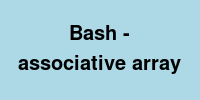Bash associative arrays are supported in bash version 4. Here is a quick start tutorial for using bash associative arrays.

Declare and initialize associative array
Before use associative array needs to be declared as shown below:
declare -A hash hash=(["k1"]="v1" ["k2"]="v2")
Get keys and values of associative array
declare -A hash
hash=(["k1"]="v1" ["k2"]="v2")
echo "keys=${!hash[@]}"
echo "vals=${hash[@]}"keys=k1 k2 vals=v1 v2
Env: GNU bash, version 4.2.46
Iterate over associative array using keys
declare -A hash
hash=(["k1"]="v1" ["k2"]="v2")
for k in "${!hash[@]}"
do
echo "${hash[$k]}"
donev1 v2
Env: GNU bash, version 4.2.46
Assign value to a key in associative array
declare -A hash
hash=(["k1"]="v1" ["k2"]="v2")
hash["k3"]="v3"
echo "${!hash[@]}"
echo "${hash[@]}"k1 k3 k2 v1 v3 v2
Env: GNU bash, version 4.2.46